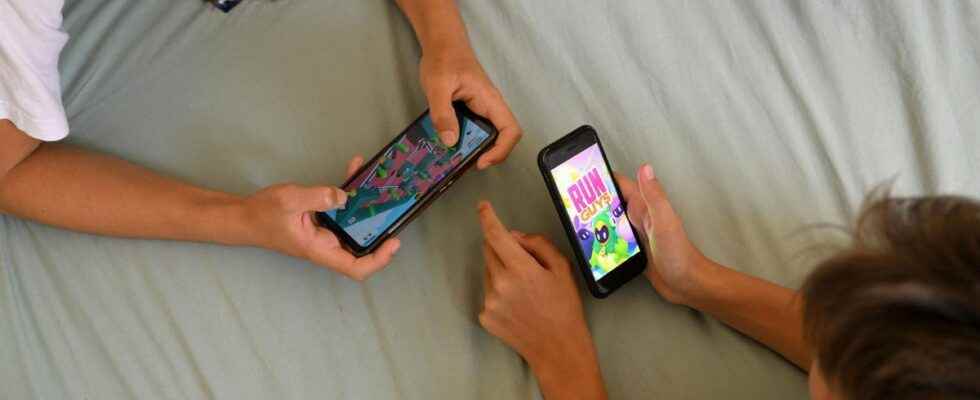Published on
Updated
Reading 3 mins.
“Sir, where is the +can opener+ for the phone?” : a student yearns to retrieve the magnet that will unlock the pocket where his phone is locked. The Marseille teenager admits to using it up to fifteen hours a day. How will he survive the disconnection challenge launched in his college for a week?
In this 9th grade class at the Vieux-Port college in Marseille, the students admit to being on screens for at least six hours a day and up to 3 p.m. on weekends. “I play”, justifies Illies (first name changed). “I sleep five to six hours a night but I know we should sleep between eight and ten hours,” says another college student.
“This has an impact on learning, their concentration, their behavior. Overexposure to screens outside school hours has negative consequences“, warns Carine Sauvayre, coordinator of the Old Port network for reinforced priority education, referring to a “public health problem”.
On average, 7-12 year olds spend nine hours a week on the internet, a figure that rises to 18 hours a week for those aged 13 and over, according to the 2022 edition of “Junior Connect”, produced with the Bayard press groups. /Milan and Unique Heritage Media.
The Vieux-Port college has therefore decided to call on one of the rare associations that works on this addiction: “Lève les yeux!”, Created in 2018.
It offers a disconnection challenge in two stages: a preparatory workshop in each of the 16 classes, then a week where everyone will be invited to limit their consumption as much as possible.
To help students, activities (failure, break-dance, cyber-harassment workshops, etc.) are offered during extracurricular times.
During the preparatory workshop, students must place their phone in a pocket that locks the device, a device used in theaters.
Then we offer them the game “Planet disconnection”. A kind of Memory, simple, effective, which invites you to think about situations with/without a screen: walking down the street with your hands in your pockets or looking at your phone, dancing in a video posted on a social network or with your friends.
When they discover the “too many screens” map, players spin around; the one labeled “meditation” invites them to breathe.
Good in your body, good in your head!
“war of attention”
“Our brain is always on even if we turn it off“, comments Hugo*. “There’s too much entertainment, we play, we reply to messages“, realizes Ousmane (first name changed).
“It’s captology: the platforms will capture your attention because the more time you spend, the more ads you watch, the more money they will earn“, replies Léo Derivot, photographer and speaker for the association.
In their book “The War of Attention”, the co-founders of Look up!, Yves Marry and Florent Souillot, digital manager at Gallimard-Flammarion, call for resistance and getting out of the “techno-cocoon”.
Chick? At the beginning of the week of the challenge, Linda significantly reduced her consumption thanks to a puzzle offered by her sister. “But then he got a Genshin Impact game update and I couldn’t resist“.
She still managed to reduce her screen time by 27%, to seven hours a day, she shows on her dashboard.
His comrades did not show overwhelming enthusiasm to follow this challenge and Illies did not participate in it at all. But all seem at least to have taken the reflex to monitor their consumption.
Among the youngest, the promise of a tree climbing outing for the winners worked better. “I was a little stressed but it was fun, I played a lot of football and annoyed my sister“, says Driss (first name changed) who had reduced his screen time to two hours.There he went back to five“.
“The students jumped on the games, chess was taken by storm, which proves that they are in demand for alternative activities to screens. We also noted a calmer school climate“, enumerates Ms. Sauvayre.
Next year, she plans to work with nurseries and kindergartens: “We see the +Covid+ children arrive at school with increased concentration difficulties, language delays, children who cannot tolerate frustration or disorders that are similar to autistic disorders which are thought to be linked. to high exposure to screens from an early age“.
